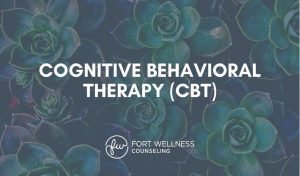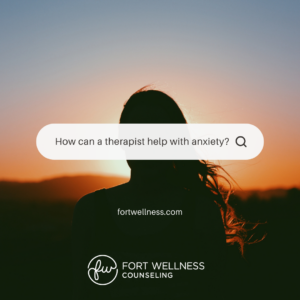Have you heard about EMDR therapy and want to learn what it is? Let me help to explain some of the highlights when it comes to EMDR therapy. It’s not uncommon for traumatic experiences to linger, impacting our present happiness. If you’re struggling to move on, EMDR therapy could be the key to healing.
EMDR (Eye Movement Desensitization and Reprocessing) is a powerful therapeutic approach that reduces distress and negative emotions caused by past traumas. Using bilateral eye movement (more on that later), our licensed Fort Worth therapist helps you reprocess those painful memories and lessen their emotional hold on your life.
Keep reading to learn how EMDR therapy can help you break free from the past and build a brighter future.
What is EMDR Therapy?
Believe it or not, EMDR therapy was discovered by accident. While on a walk, Dr. Francine Shapiro noticed that her eye movements minimized her negative emotions. This led to a revolutionary idea: could eye movements help others heal, too?
EMDR is a relatively new therapy that relies on the brain’s natural ability to heal from trauma. Many past experiences can get “stuck” in the body, causing emotional distress. However, EMDR therapy uses bilateral eye movements (think of how your eyes move when reading) to reprocess those memories and release their emotional grip.
Just like your body heals physical wounds, EMDR helps your brain process past experiences and move forward. (This is the same way that scar tissue protects a past injury without preventing its future use.)
What Conditions Can EMDR Therapy Help With?
EMDR therapy has been getting a lot of buzz lately, with even celebrities singing its praises. It’s not hard to imagine why, as research shows it’s a powerful resource for treating various conditions:
PTSD and Other Trauma Disorders
EMDR therapy has transformed the lives of many – especially those struggling with Post Traumatic Stress Disorder (PTSD) and other trauma-related conditions.
So how does it work? Well, during an EMDR session, you’ll focus on a specific movement — like following your therapist’s finger back and forth — while revisiting a disturbing memory. This seemingly simple technique helps your brain reprocess the experience in a healthier way. Ultimately, EMDR helps you work through the trauma and release the negative emotions or lingering symptoms that have been holding you back.
If you’re struggling to move on from a difficult experience, EMDR therapy offers a path forward. This includes religious or spiritual trauma, narcissistic abuse, or any other event that has left you feeling stuck.
Anxiety and Depression
While EMDR therapy is often associated with treating trauma and PTSD, it’s also a powerful tool for managing anxiety and depression.
Here’s why: EMDR doesn’t just focus on managing symptoms. It addresses the underlying issues contributing to your anxiety or depression. By helping you identify and process the root cause(s), EMDR promotes true emotional healing instead of merely offering coping skills. (This is particularly helpful for those who feel stuck managing symptoms without addressing the source.)
What to Expect in an EMDR TherapyAppointment?
So, you bravely scheduled your first EMDR appointment with one of our Fort Worth counselors! Now, what should you expect?
We’ll start by getting to know you and your goals. This initial conversation ensures we’re on the same page and working towards what matters most to you.
After this initial conversation, we’ll follow the eight phases of EMDR therapy:
- (Phase 1) Patient History & Info-Gathering: We’ll understand your background and what brings you to therapy.
- (Phase 2) Preparation & Education: We’ll explain EMDR in detail and answer any questions you have.
- (Phase 3) Assessment: We’ll identify specific memories and emotions to target.
- (Phase 4) Desensitization & Reprocessing: You’ll focus on a difficult memory while your therapist uses eye movements to help you process and release strong emotions.
- (Phase 5) Installation: We’ll work on replacing negative beliefs with positive ones.
- (Phase 6) Body Scan: We’ll check in with your physical sensations to ensure emotional release.
- (Phase 7) Closure & Stabilization: We’ll wrap up the session with techniques to maintain your progress.
- (Phase 8) Reevaluation & Continuing Care: We’ll discuss your progress and plan for future sessions.
Here’s the key takeaway: EMDR therapy helps you detach from the emotional weight of past experiences. Imagine your therapist as a guide, walking you through a memory while using eye movements to unlock emotional processing. This leads to a decisive shift – moving from feeling defined or limited by the past to feeling empowered by it.
Common Misconceptions about EMDR Therapy
One concern people sometimes have about EMDR therapy is that it won’t work if they don’t have crystal-clear memories of their traumatic events. But that’s not the case! EMDR is just as effective even if you can’t describe everything in detail.
That’s because some memories are stored differently (beyond words). EMDR taps into these deeper aspects and helps you process the trauma – even if you can’t quite put it into words. Not only that, but EMDR addresses how trauma is held in the body, allowing for a more complete healing experience.
Another misconception is that EMDR is like hypnosis. However, that couldn’t be further from the truth! You’re completely awake and in control throughout the entire EMDR session. You’re actively engaged in the process, working with your therapist to address the trauma.
Typical Hesitations about EMDR
One concern we often hear from clients considering EMDR is the fear of losing control, But let us assure you, EMDR doesn’t work like that. As we mentioned, it doesn’t put you in a trance or alter your consciousness.
Another worry some people have about EMDR is that will make their traumatic memories worse. Thankfully, research suggests the opposite is usually true. However, if you do experience frequent flashbacks or suffer from epilepsy, it’s always a good idea to talk to your doctor before starting this process.
Get Started with EMDR Therapy in Fort Worth, TX
What’s most exciting? EMDR highlights the amazing capacity of the brain to heal. These eye-opening (pun intended) sessions demonstrate that our brains are incredibly powerful and capable of healing themselves from past experiences.
Looking for EMDR therapy? You’re in luck! Fort Wellness Counseling has a great team of EMDR therapists. Several of our clinicians are trained and certified in EMDR therapy. Schedule an appointment to get started.


















































































